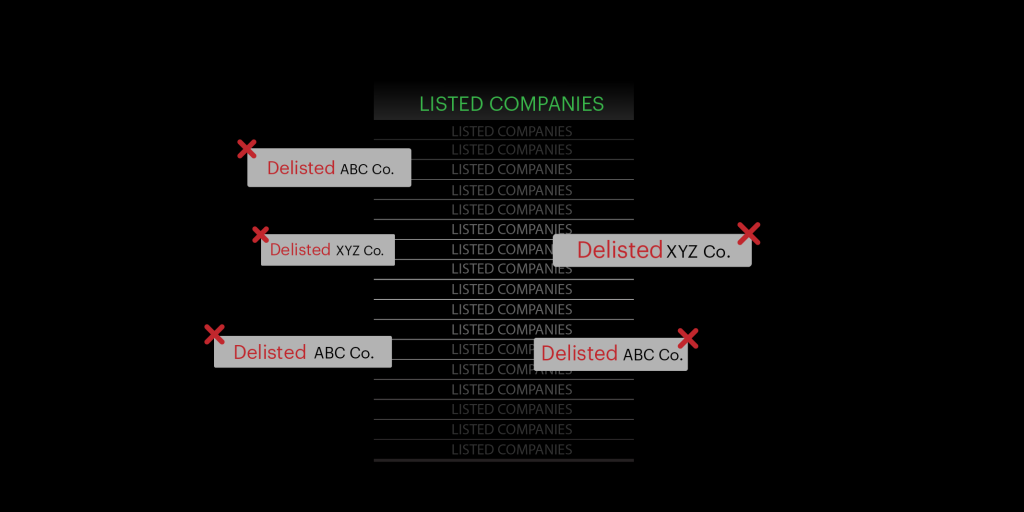Last Updated on Feb 10, 2022 by Ayushi Mishra
Delisting is the process of removing the company from the stock market, which results in their shares becoming inaccessible for public trading. While this may unnerve some investors and is often seen as a negative sign for investor confidence in the company, the company may have some valid reasons to pull the plug. Delisting, nonetheless, leaves new investors wondering what will happen to the money they have invested in the shares of such companies.
What happens to the shares they hold in their demat once a company announces delisting of shares? Let’s dive into the details of the concept of delisting of shares to help you understand the delisting process and avoid panic!
Table of Contents
The article covers:
- What is delisting of shares?
- What are the types of delisting?
- How to get back money in case of delisting of shares?
- How to use delisting of shares as an investment strategy?
What is delisting of shares?
In simple terms, delisting of shares takes place when a company is no longer willing to offer its shares for trading to investors at the stock market. As a result, the company removes its shares from the stock exchanges.
This turns the company from a public-listed company to a private company. Note that should a company’s shares be available on multiple platforms of the stock exchange and are removed from only one of the platforms, it is not considered as delisting.
What are the types of delisting?
The categorization is mainly based on the cause for delisting – voluntary or involuntary. Let’s take a look.
Voluntary delisting
As the name suggests, voluntary delisting takes place when a company voluntarily decides to pull out all its shares and makes them unavailable for trading.
In the case of voluntary delisting, the company would and has to pay a price in exchange for all the shares held by the shareholders.
Causes of voluntary delisting
Below are a few causes for voluntary delisting. Voluntary delisting of a company takes place when:
- There is a change in the entire structure of the company. This can occur when the organization is taken over by an investor who wants a majority share in the company.
- The company feels the exchange’s regulations are hindering the company’s functioning and so, it may decide to delist all its shares.
- A listed company finds the listing fees of the stock exchanges burdensome, especially when the benefits are disproportionate to the company or its stockholders.
- There is a regional imbalance of the holders of the securities—due to relocation of the company’s registered office or of the manufacturing unit, or for any other reason.
- There is a case of negligible trading or total absence of trading for a substantial period of time.
- The company has either suspended its business or is under closure, or has become a sick unit.
- It has a small capital base or has failed to comply with the increasing requirement of the capital.
- There are mergers, amalgamations or takeovers.
Involuntary or compulsory delisting
When a company is compelled to conduct delisting of shares and stop trading, it is called involuntary delisting. There could be various reasons or situations for involuntary or compulsory delisting of company shares. Below are a few of the reasons.
Causes of involuntary or compulsory delisting
- Non-compliance with the regulations set by the stock exchange platforms, i.e., listing requirements and listing agreement.
- Non-payment of listing fees.
- Whereabouts of the company, its directors and promoters are unknown.
- Inconsistent trading of shares or unfair trading practices identified over the past three years can cause delisting of securities for 6 mth as penalty.
- The net worth of the company is negative due to substantial losses that occurred in the past three years.
- Malpractices such as fake or duplicate share certificates identified.
To summarize this – with voluntary delisting, a company decides to remove its securities from a stock exchange on its own accord. In involuntary delisting, the securities of a company are removed from a stock exchange as a penal measure.
Now let’s get to the most important part of delisting shares: knowing what to do when a company’s stock that you have invested in gets delisted.
Fact: With voluntary delisting, a company removes its securities from a stock exchange on its own accord. Click To TweetHow to get back money in case of delisting of shares?
When shares get delisted it means you can’t buy more or sell what you have on NSE or BSE. However, you still own the shares and are eligible to sell them on other stock exchanges.
In a situation of a voluntary delisting, you will have to buy the shares through the process of reverse book building. Through this process, all the shareholders receive an official letter from the acquirer with information on the buyback. Furthermore, you as a shareholder will also receive a bidding form along with the official letter.
After you receive an offer from the acquirer, you can either decide to exit by accepting the offer, or deny the offer and continue to hold the shares. When the required number of shares are bought back by the acquirer, delisting of shares is considered as successful.
However, when you fail to sell the shares to promoters or acquirers within the assigned window, you may alternately sell them to the buyer on the over-the-counter market. Should you choose this, you may need to be patient, anticipating the drop in liquidity. Therefore, selling shares over the counter market may be time-consuming.
How to use delisting of shares as an investment strategy?
You may stand a chance to receive substantial profits if you manage to sell the shares for a premium price to the promoters during the buyback window. As a shareholder, that is an opportunity to enjoy profits as the price may drop once the buyback window ends.
In case of involuntary delisting, the acquiree buys back the shares from the shareholders at the cost decided by an independent evaluator. It is possible then, that the company shares are priced at a lesser value; this is usually the case with involuntary delisting of shares. Like in the case of voluntary delisting, involuntary delisting also does not affect your ownership of shares.
If a company delists its shares in India from all the stock exchanges except for BSE and NSE, it does not have to offer any exit amount to shareholders because it is still available for trading on the BSE and NSE. In such a case, you as a shareholder can exit any time by selling shares on the NSE/BSE.
Remember, it is still possible to trade delisted companies. In many cases, post the news of the delisting, there is an upward trend in the share prices of these companies as the delisting news arouses interest within the investor community to buy the company’s shares—the reason being, the exit price of the delisted company would generally be higher than the current low market prices.
- List of Best Gilt Funds in India for 2025 - May 8, 2025
- Alternative Investment Fund (AIF): Meaning, Types and Benefits - Apr 29, 2025
- Best Large Cap Mutual Funds in India (2025) - Apr 29, 2025





